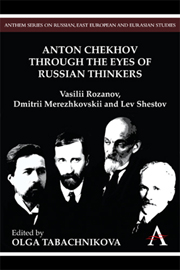 Anton Chekhov Through the Eyes of Russian Thinkers
Anton Chekhov Through the Eyes of Russian Thinkers Book contents
- Frontmatter
- Contents
- Acknowledgments
- Introduction
- List of Names
- List of Russian Cultural Concepts
- Three Brief Biographies – Rozanov, Merezhkovskii and Shestov
- Part One Vasilii Rozanov
- Part Two Dmitrii Merezhkovskii
- 5 Chekhov and Merezhkovskii: Two Types of Artistic-Philosophical Consciousness
- 6 Negating His Own Negation: Merezhkovskii's Understanding of Chekhov's Role in Russian Culture
- 7 An Illuminating Misinterpretation? On Merezhkovskii's Literary Criticism of Chekhov
- 8 Can Merezhkovskii See the Spirit in the Prose of Flesh?
- Part Three Lev Shestov
- Notes on Contributors
5 - Chekhov and Merezhkovskii: Two Types of Artistic-Philosophical Consciousness
from Part Two - Dmitrii Merezhkovskii
Published online by Cambridge University Press: 05 March 2012
- Frontmatter
- Contents
- Acknowledgments
- Introduction
- List of Names
- List of Russian Cultural Concepts
- Three Brief Biographies – Rozanov, Merezhkovskii and Shestov
- Part One Vasilii Rozanov
- Part Two Dmitrii Merezhkovskii
- 5 Chekhov and Merezhkovskii: Two Types of Artistic-Philosophical Consciousness
- 6 Negating His Own Negation: Merezhkovskii's Understanding of Chekhov's Role in Russian Culture
- 7 An Illuminating Misinterpretation? On Merezhkovskii's Literary Criticism of Chekhov
- 8 Can Merezhkovskii See the Spirit in the Prose of Flesh?
- Part Three Lev Shestov
- Notes on Contributors
Summary
Chekhov took an interest in Merezhkovskii after the latter wrote an extensive article on the writer in the November 1888 issue of The Northern Herald (Severnyi Vestnik). In his letter to Suvorin of 3 November, Chekhov, providing a detailed analysis of the article (unprecedented in Chekhov's letters), expressed a series of problems he had with the author. The main one was a disagreement on the point that problems of creativity cannot be reduced to the laws of nature:
Whoever has absorbed the wisdom of the scientific method and who therefore is able to think scientifically experiences many wonderful temptations […] One wishes to find the physical laws of creativity, to capture the general law and formulae by which an artist, feeling them instinctively, creates musical pieces, landscapes, etc. […] From this springs the temptation – to write a physiology of the creative act (Boborykin), and in the case of those who are more young and shy – to refer to science and the laws of nature (Merezhkovskii).
There were other charges too – that Merezhkovskii finds ‘failures’ amongst Chekhov's heroes, and thus follows the well-trodden path: ‘It's time to abandon failures, superfluous people and to invent something of one's own’.
However, Chekhov assessed the article on the whole – indeed one of the best in the early Chekhoviana – as ‘quite a pleasant thing’.
Chekhov also liked the author himself. ‘Twice the poet Merezhkovskii visited me’, Chekhov wrote to Suvorin on 5 January 1891; ‘he is a very clever person’.
- Type
- Chapter
- Information
- Anton Chekhov Through the Eyes of Russian ThinkersVasilii Rozanov, Dmitrii Merezhkovskii and Lev Shestov, pp. 93 - 112Publisher: Anthem PressPrint publication year: 2010


